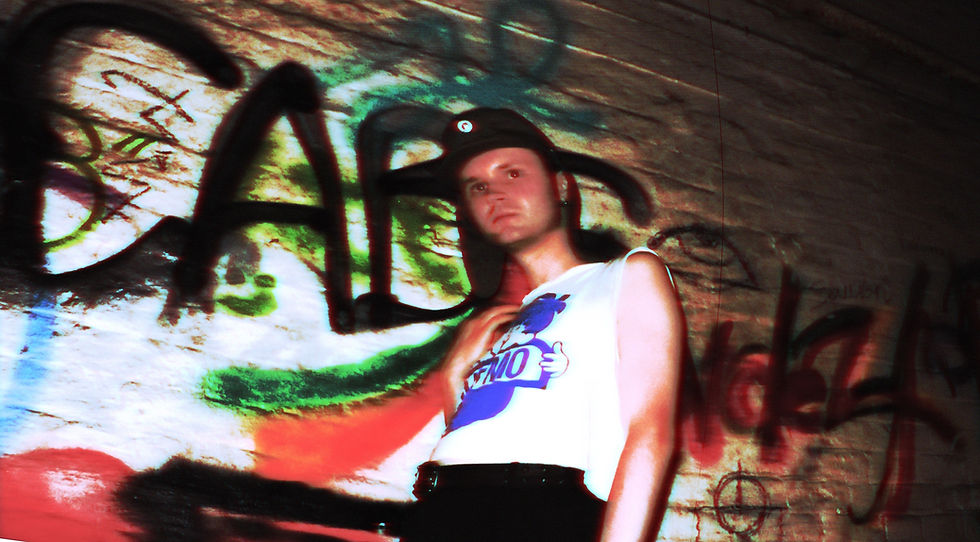crimewave interview
- marketingeventscoo
- Dec 2, 2024
- 4 min read
Dive into the world of Crimewave, an artist who fuses the ethereal textures of 90s shoegaze with the pulsating energy of modern electronic music. Often likened to My Bloody Valentine meeting Aphex Twin, his music is a visceral experience—layered, fractured, and boldly experimental. As Crimewave gears up to perform at Next Door Records Two this Thursday, 5th December, we uncover the inspirations, challenges, and artistic evolution behind his work.
From gritty Northern nightlife to surreal moments on rain-slicked streets, his debut EP Altercation channels the raw energy of post-lockdown life, capturing scenes of chaos and community in equal measure. With past performances alongside legends like Kim Gordon and George Clanton, Crimewave is firmly rooted in the UK underground scene, constantly pushing the boundaries of sound and storytelling.
Join us as we delve into his creative process, explore the unconventional techniques behind his distinctive sound, and look ahead to what’s next for this pioneering artist.
What inspired the surreal, fractured, and distorted world you create in your music?
When I was around 16 I discovered dance music and My Bloody Valentine. I remember hearing a lot of synths at the time that really swelled and filled the headspace of the track, so my first foray into writing music as Crimewave was a moment of ‘what if I recorded a wall of sound guitar and tried to make it move like this synth’.
Can you share your experience creating Altercation and how it reflects the gritty Northern nightlife?
Altercation was inspired by a number of experiences on nights out after the pandemic had ended. Seeing a lot of the usual scenes of nightlife for the first time in a while made a massive impression on me, as well as some encounters that were a bit more up close and personal than they had been in the past.
Your music draws from real-life surreal moments. What’s the most vivid or impactful moment that’s inspired your work?
There was this one time where a group of girls were crossing the road at about 1am in Manchester, the first weekend after lockdown ended. In the space of about 5 seconds one of them managed to fall over, one threw their phone onto the curb which smashed, and the entire group nearly got ran over twice from oncoming traffic from both directions.
You’ve supported acts like Kim Gordon and George Clanton. What were those experiences like, and what did you take away from them?
Both of them were amazing and my first 1000+ capacity venue shows. Kim Gordon was incredible for having the chance to support someone of that cultural magnitude - and then George Clanton was great for how wild the crowds were every night. His fans would also queue up round the block for every show and be there front row before any music had started.
Do you use any unconventional techniques or gear to achieve your distinctive sound?
I pretty much only use guitars to create my sound. I use drum samples, my voice, and then everything else you hear is a distorted guitar, maybe paired with some sub bass. I fell in love with the idea of recreating my favourite dance tracks using only guitars a while ago. It really helps me write as well, knowing I can only use the guitar, as oppose to getting lost in the endless possibilities of what a DAW can do.
What’s the biggest challenge in bringing your studio sound to a live audience?
Figuring out what to play. Because all the tracks are written in the box on a laptop, I have to reverse engineer my set, and figure out what I want to play as oppose to play it how I wrote it.
Beyond music, what other forms of art or media inspire your work?
I do all the visuals too so any short film, artwork or graphic design can spark my attention. The Altercation zine I made for the EP release was inspired by the magazines I’d flip through in a store called Village Books in Manchester. A lot of the covers, materials and bindings are pretty unorthodox - something that was super new to me at the time.
As an artist in the UK underground scene, what challenges and opportunities do you see for the future?
I see a lot less venues about to play in. This week alone I’ve seen three close. I’m hoping with a few things in the pipeline I might be able to start playing shows in Europe and further in the new year.
Where do you hope to see yourself and your music in five years?
At least being able to partially support myself financially with my music, that would be cool. I hope the music continues to evolve and change so that it doesn’t sound too much like my previous work. I hate it when artists rinse and repeat for most of their career.

By the REAL Editorial Team | Dec 1, 2024



